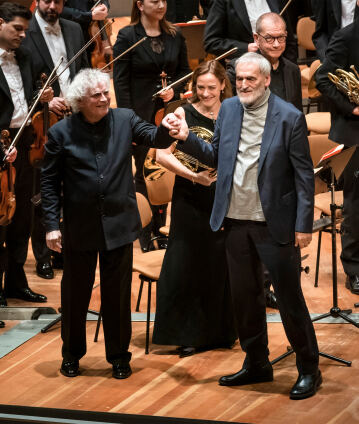Sir Simon Rattle conducts Schumann and Lachenmann

During his Berlin years, the adventurous exploration of contemporary music was as important to Simon Rattle as work on the traditional repertoire. This double focus also characterises this evening with Helmut Lachenmann’s My Melodies for eight horns, in which the solo instruments reveal many surprising tonal facets. The finale of the concert is Schumann’s Second Symphony, with an exuberance which repeatedly borders on mania.
Helmut Lachenmann has always had the sporting ambition to lure his audience out of their comfort zone: “‘Try to like it!’ I said to Prince Charles at our strange encounter in London when he said, ‘Modern music is so difficult to understand!’ And I allowed myself to paraphrase Ophelia’s father Polonius from Shakespeare’s Hamlet: “There is method in our madness”. We shouldn’t have fun, but be serious. Serious in the positive sense of mindful discovery and developing contexts, the way we each encounter them in different ways. And it’s always fun to say, ‘Be serious’ – that can have unexpected consequences …”
Lachenmann says his concerto for eight horns and orchestra was a special challenge, because he was forced “to find something like a harmony within the instrumental line-up of eight horns. Now there are four note chords, two note chords, eight note chords. It’s about constantly developing new and different sensitivities. And if that’s the case, then even a C major triad is possible.” After Sir Simon Rattle premiered Tableau, an orchestral work by Helmut Lachenmannin in 2011, he and the Philharmoniker now perform Lachenmann’s large-scale concerto with a spectacular constellation of solo instruments.
A composer who was not deterred by the multiplication of the horn as a solo instrument with his Concert Piece for four horns was Robert Schumann, whose Second Symphony continues the programme after the interval. In this work, consistently oriented towards the finale, the great Romantic followed the model of Beethoven’s final symphonies. This is another reason why Ernst Gottschald drew a comparison to Beethoven’s Ninth Symphony in the 1850 Neue Zeitschrift für Musik, whereby Schumann had made the “greatest progress” in instrumental music “far beyond Beethoven”: “Ludwig could not yet do it with mere instruments, he had to borrow the word from the art of poetry, Robert does it with instruments alone for the first time.”
© 2019 Berlin Phil Media GmbH
Related interviews